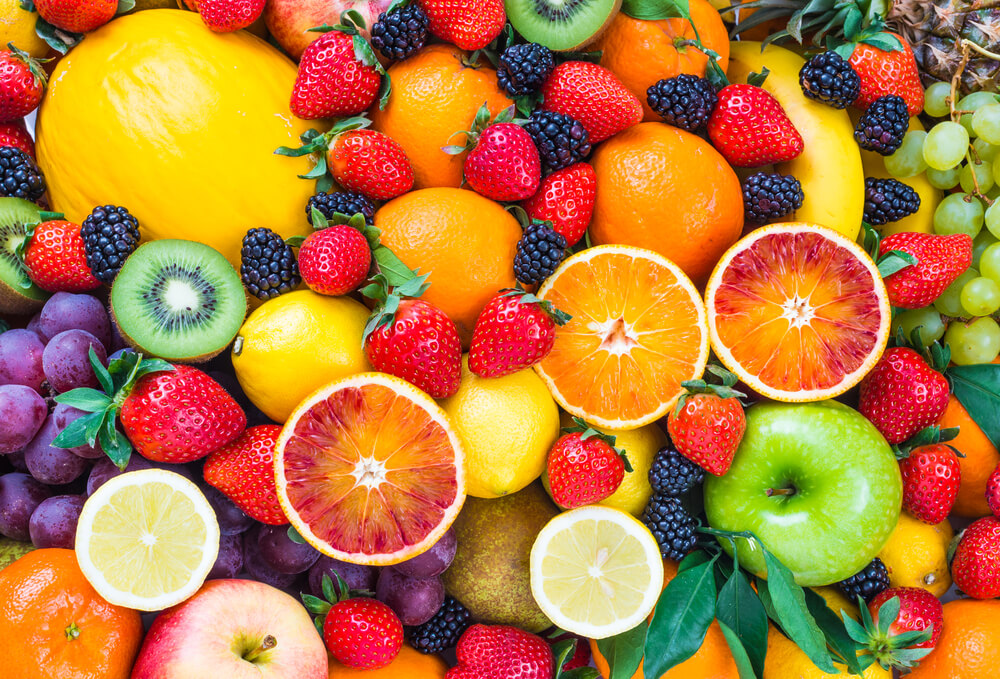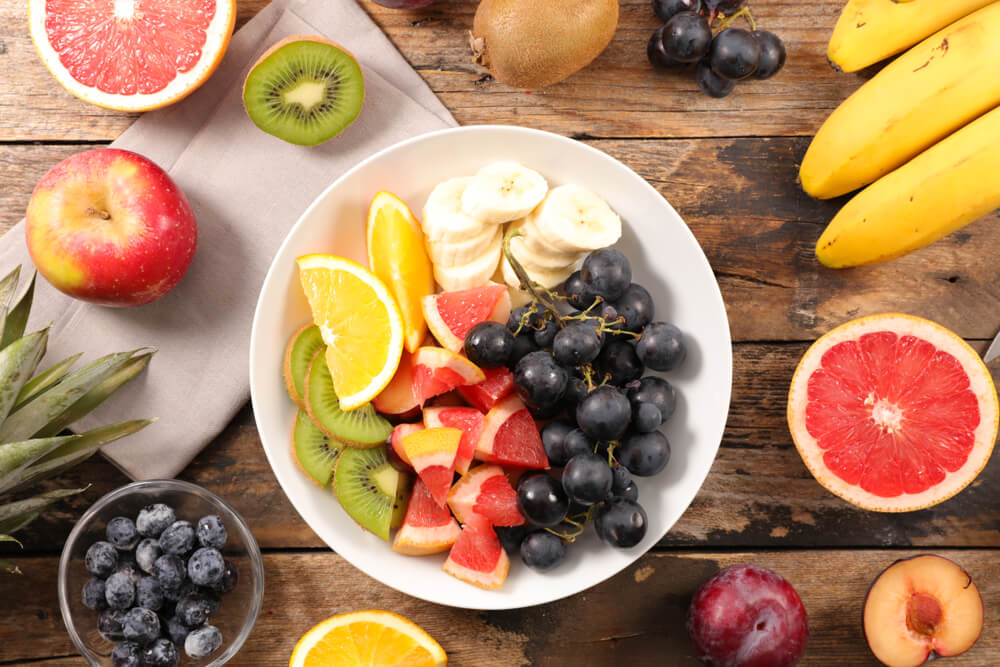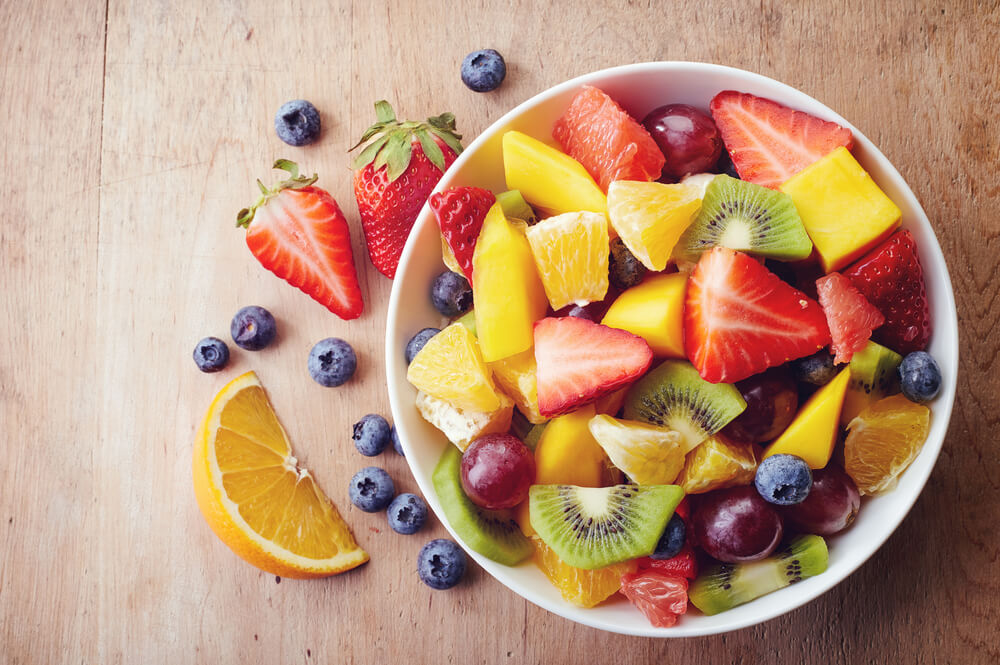
There are diets based on just about every food group imaginable. One particular diet that has picked up some interest in the last several years is the Fruitarian Diet, or better known as the fruit diet. As you might guess, this is a diet based around fruit. Think of it as taking the vegan diet to an entirely new height.
Now, there are a few ways you can tweak the diet to fit your specific dietary needs, but in reality you need to decide is whether it works for you now, and in the future. Because, as is the case with any diet, you need it to be a way of life, not just something you do a few days in a row. But we’ll get into that further down.
First, let’s dive into what the fruit diet is, and what it requires you to do.
What Is The Fruit Diet?

The fruit diet is essentially a variation of a vegan diet. As the name suggests you will eat primarily fruits, although this is not your only source of calories. Fruit, while packed with a number of healthy vitamins, is not a good source for protein, which is essential for repairing damaged muscle tissue and for generating low calorie energy.
In general, most of your food will consist of raw fruit. This means you’ll avoid canned fruit and frozen fruit, when possible. You can consume frozen fruit, just make sure to check the ingredients label to make sure it does not include sugar. A number of frozen food products are packed with sugar to enhance the flavor (some may even include some sodium, so you’ll want to avoid this as well).
Ideally you’ll avoid canned fruits though. Canned fruits almost always contain additional sugar in the form of syrup (even if the fruit is canned in water there is usually some kind of additional ingredient to help extend the shelf life).
There are secondary foods you can add to the diet to help off-set the nutrients you will not be able to consume with fruit alone. This includes nuts, seeds, and vegetables, although all of these items are kept in moderation. It is important to keep fresh fruits as the main ingredients within the diet.
Some foods, including legumes and whole-grains can be added, although it is important to severely limit the intake of these foods. Anything that requires cooking, including cooked fruit, is not part of the diet (Medical News Today, 2020).
The main purpose of going with the fruit diet is to go as fresh as possible. Cooking fruits (and vegetables) can cut out many of the important nutrients found within the fresh fruit. This means you won’t consume the same level of fiber and vitamins in prepared fruit. Stick to fresh fruit whenever you can.
Thankfully, different fruits are available throughout the year, so you can at least switch up the kinds of fruits you consume. And if you have room on your property, you may want to consider investing in fruit bushes or trees (there are smaller dwarf versions of most fruit trees, which makes it possible to grow just about any fruit tree inside your home).
What Exactly Are The Health Benefits To The Fruit Diet?

The exact benefits to the fruit diet will depend on what kinds of fruits you end up eating. The kinds of nutrients packed into a plume is far different from the kinds of nutrients found in an apple. So, if you have specific dietary requirements it is a good idea to look at the different fruits available in your local store and then investigate the nutritional value.
This is also the case if you suffer from any kind of health problems. Some fruits can actually be dangerous if consumed in mass quantities. Star fruit, for example, may cause health problems with your kidneys. This is because, according to the National Kidney Foundation), star fruit contain a toxin that is toxic to people who suffer kidney disease. It may also affect the brain and lead to neurological disorders (the specific toxin found in star fruit is called neurotoxin). This is why you should always consult your doctor before starting any kind of new diet.
If you’re looking to lower your cholesterol, you’ll want to focus on foods containing a large amount o fiber. This includes most berries, apples, and bears. If you have problems maintaining a regular bowel movement you will want to consider this kind of diet as well as the natural fiber will help.
If you are looking to boost your immune system you will want fruit that is high in vitamin C. Orange juice is a popular option for individuals who are looking to boost their immune systems, but other foods include strawberries (in general, most berries, including blueberries and raspberries, are excellent sources for vitamins).
On the other hand, if you struggle with high blood pressure you will want to increase your consumption of fruits with higher levels of potassium. The most common fruits (that are also inexpensive and found throughout the year) are bananas. Mangos are another excellent source for potassium (as well as several B vitamins). Cantaloupes and guavas also come packed with potassium, which allows you to customize your fruit diet. It also helps if you are someone who enjoys a fruit smoothy. By selecting different fruits and adding in crushed ice you can personalize smoothies (without adding any dairy products).
One of the the main benefits to increasing your fruit consumption is you will eat more antioxidants. Fruits are some of the best natural ingredients when it comes to this. If you want to maximize your antioxidant intake you’ll want to again focus on berries (blueberries are the kind here), as well as plums and prunes. Antioxidants help with the removal of free radicals, which in turn can lower your risk of different kinds of cancer (Medical News Today, 2020).
Most Fruits Are High In Natural Sugar
While natural sugar is different from the sugar you find added in foods, it still can have some adverse effects on your body. This is especially true if you are diabetic or your body does not process sugar well (although if you are diabetic you likely should avoid an all-fruit diet).
In general, if you are interested in finding fruits that are low in sugar there are a number of options. First, most fruits that are tart, such as limes and lemons, are low in sugar. Yes, you probably are not going to just chow down on limes, but these are good for adding flavor to water or other foods you might consume.
Grapefruit is low in sugar and makes for a nutritious snack (just don’t pour sugar over top of the grapefruit). Watermelon is also an excellent low-sugar fruit. Most of a watermelon is, as the name suggests, full of water, and when watermelons are in season you can find these fruits for cheap.
Avocados are another low-sugar fruit. Of course, avocados are also packed with more calories due to the healthy, natural fat found in the avocados, but if you want something that is technically a fruit and yet doesn’t have the sugar, shop for an avocado (Healthline, 2016).
What Are Some Of The Potential Health Risks Of An All Fruit Diet?
As is the case with any restrictive diet, the fruit diet does have its own potential health risks. When consuming an almost all-fruit diet, you will cut out some important nutrients. Protein, for instance, is at the top of the list.
You can add in protein to your diet through nuts, and you should attempt to add some additional protein through occasional legums, but in general, this is not a high-protein diet. If your goal is to put on muscle, this is not the diet for you (or even maintain your muscle mass, as you likely will not consume enough protein to do so).
On the flip side, your intake of fat will be low as well. While this might sound like a good thing, fat comes with an increase of calories that help give you the essential energy to get through the day.
Omega-3 fatty acids are on the low end, although you can make up this with avocados (which you can also use to help make out the lack of fat). Calcium and B vitamins are other natural vitamins you won’t be getting much of. You’ll probably want to add supplements and vitamins to your daily regimen in order to help make up for what you’re not getting through the food (Healthline, 2017).
How To Begin Your Fruit Diet

This particular diet will significantly cut down the amount of calories you are consuming. This can be a shock to the system if you move instantly to this diet. A smooth transition while you slowly take out foods while adding others is the best way to go about this.
First, you will want to remove any kind of alcohol. When eating mostly fruits your body will not have the extra cabs or proteins to absorb the alcohol in your digestive system. This means the impact on your body will be more severe. You also won’t have the proteins to repair damage the alcohol might do to your body, which can leave you feeling weak. Due to this, alcohol should be the first thing you remove from your diet.
Next up you’ll want to focus on animal proteins and anything derived from animals. If you’re already vegan you’ve already done this. However, for anyone who regularly consumes meats, milk, or cheese, this will likely be the most difficult food group you’ll need to nix. From here, you can begin to remove grains, processed foods, and eventually caffeine.
Again, the main purpose of this diet is to go as natural and as fresh as possible. Alcohols, grains, caffienes, processed foods, these are generally not natural (although if you want to sip some unsweatened tea that isn’t against the rules of the diet).
During the diet, you will want to add some kind of protein to every meal, as the fruits you’re consuming are light on any protein (many don’t have any protein at all). This means adding some nuts and seeds to your meals.
There are a handful of fruits that do have some protein. Guavas have about 4.2 grams of protein per cup, while avocados have four grams per cup (you need to keep avocados on hand for that addition of natural fats and proteins your diet will be missing). Apricots do have about 2.2 grams of protein per cup, while kiwi have 2.1 grams per cup (My Food Data).
Do what you can to try and keep some of these fruits on hand. The lack of protein is really the biggest issue with the diet, so if you’re able to add some fruits, nuts, and seeds throughout the day to help offset this, you’ll have a greater success with the diet. It will also help keep you feeling full longer.
In Conclusion
There are a number of health benefits behind the fruit diet. However, as is the case with every diet out there, it isn’t for everyone. This is a restrictive diet that will cut out a number of foods that you may need. Prior to starting any kind of restrictive diet such as the fruit diet it is important to consult with your primary healthcare provider.
This particular diet does consist of a number of healthy carbs and sugars, but if you are diabetic or suffer from other health conditions it may not be the right diet for you. Your doctor can help you determine if the fruit diet is safe or if you should consider another diet.
If you are given the go-ahead, by all means check this diet out. It offers healthy food options and it will help you avoid processed foods and simple carbs. Whatever you decide to do, consider transitioning into the fruit diet slowly if your primary diet consists of meats and other processed foods. This will help reduce the sudden impact such a diet will have on your system.
-Terry Asher
Terry Asher
Latest posts by Terry Asher (see all)
- Better Family – Product Review Liquid Daily 2 oz - Dec 16, 2024
- Post-Workout Recovery: The Key to Optimal Performance - Nov 25, 2024
- Pre-Workout Supplements – Everything You Need To Know - Nov 18, 2024












[…] post Is the fruit diet a good option? appeared first on Gym […]
[…] This article was originally published by Gymjunkies.com. Read the original article here. […]
[…] Source link […]
[…] Read The Entire Article By Terry Asher Here. […]
[…] Source link […]
[…] To give you a starting off point, we’ll go over some of the best low fat foods you should begin adding to your diet. First, add in any leafy greens. Whether salad, kale, spinach, or another form of leafy greens, these foods are low in fat, higher in fiber, and bursting with vitamins. Likewise, you’ll want to add fruit to your diet. […]
Fruit diet is actually great for this option.
[…] it is beneficial to add some fructose from fruits. The antioxidants and fibers in fruits are helpful towards our goals with a high carb day or […]